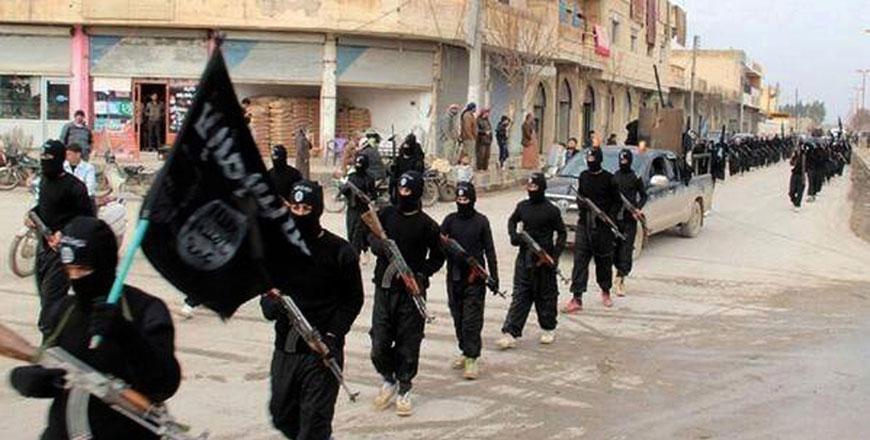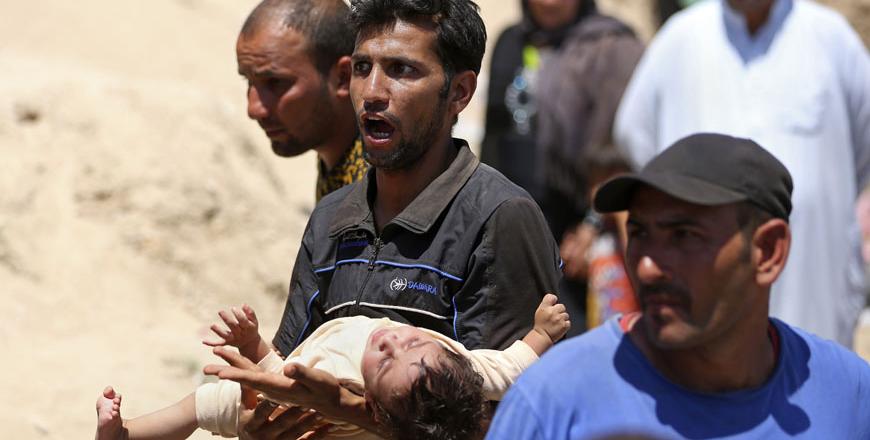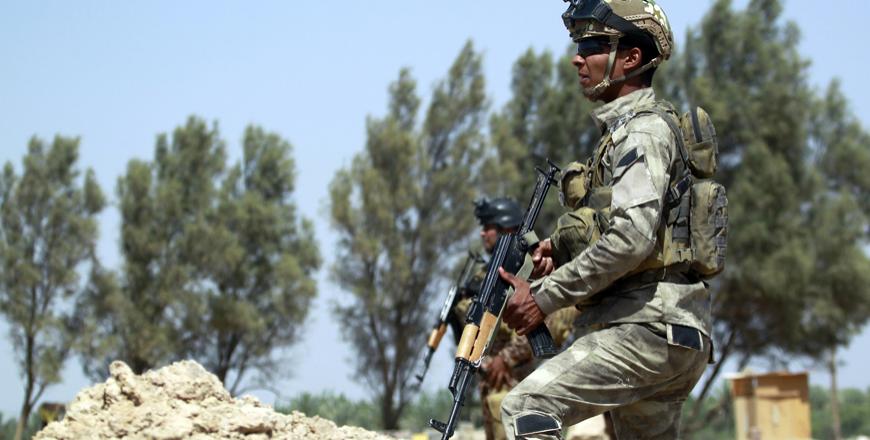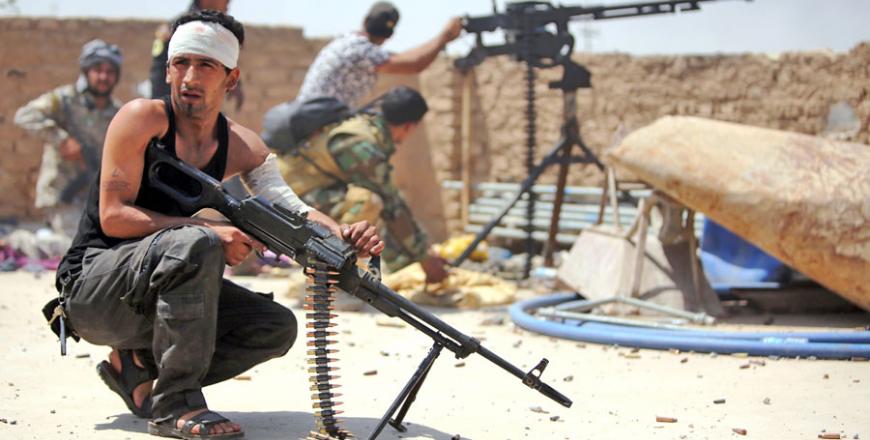You are here
Daesh says in full control of Syria's Palmyra after westward advance
By Reuters - May 21,2015 - Last updated at May 21,2015

AP file photo This undated file image posted on a militant website, January 14, 2014, which has been verified and is consistent with other AP reporting, shows fighters from Al Qaeda linked Islamic State of Iraq and the Levant, now called Daesh group, marching in Raqqa, Syria (AP file photo)
BEIRUT — Daesh fighters tightened their grip on the historic city of Palmyra in Syria, days after capturing a provincial capital in neighbouring Iraq, suggesting the growing momentum of the group which a monitor says now holds half of Syrian territory.
The twin successes pile pressure not just on Damascus and Baghdad, but also throw doubt on US strategy to rely almost exclusively on air strikes to defeat Daesh.
Extending its reach in the region, fighters loyal to the Sunni Muslim group have also consolidated their grip on the Libyan city of Sirte, hometown of former leader Muammar Qadhafi.
Daesh said in a statement posted by followers on Twitter on Thursday it was in full charge of Palmyra, including its military bases, marking the first time it had taken a city directly from the Syrian military and allied forces.
Around a third of the 200,000 people living in Palmyra may have fled in the past few days during fighting between government forces and Daesh militants, the UN human rights office said on Thursday.
Citing what she said were credible sources, UN human rights spokeswoman Ravina Shamdasani in Geneva also said there were reports of government forces preventing civilians leaving until they themselves fled and Daesh, also known as ISIS or ISIL, took control of the city.
"ISIL has reportedly been carrying out door-to-door searches in the city, looking for people affiliated with the government. At least 14 civilians are reported to have been executed by ISIL in Palmyra this week," Shamdasani said in e-mailed comments.
The Britain-based Syrian Observatory for Human Rights said Al Qaeda offshoot now controls more than half of Syrian territory following more than four years of conflict which grew out of an uprising against President Bashar Assad.
The ultra hardline group has destroyed antiquities and monuments in Iraq and there are fears it might now devastate Palmyra, home to renowned Roman-era ruins including well-preserved temples, colonnades and a theatre.
The UN cultural agency UNESCO describes the site as a historical crossroads between the Roman Empire, India, China and ancient Persia and a testament to the world's diverse heritage.
"We may have different beliefs... different views, but we have to protect such incredible vestiges of human history," UNESCO Director General Irina Bokova told Reuters Television.
The observatory's founder Rami Abdulrahman said Daesh fighters had entered the historical sites by early on Thursday but there were no immediate reports of destruction.
"This is the fall of a civilisation," Syria's antiquities chief Maamoun Abdulkarim told Reuters. "Human, civilised society has lost the battle against barbarism."
‘War crime’
Al Azhar, the centre of Islamic learning in Egypt, called on the world to protect Palmyra, saying the destruction or looting of cultural heritage was religiously forbidden.
Clashes in the Palmyra area since Wednesday killed at least 100 pro-government fighters, said Abdulrahman, who bases his information on a network of sources on the ground.
Syrian state media said pro-government National Defence Forces had evacuated civilians before withdrawing.
The assault on the city is part of a westward advance by Daesh that is adding to pressures on Syria's overstretched army and militia, which have also recently lost ground in the northwest and south.
Capturing the city marks a strategic military gain for Daesh, because it is home to modern army installations and situated on a desert highway linking government-held Damascus and Homs with Syria's mainly rebel-held east.
The European Union's foreign policy chief expressed fears that thousands of people in Palmyra were at risk as well as the cultural sites.
"Mass killings and deliberate destruction of archaeological and cultural heritage in Syria and Iraq amount to a war crime," Federica Mogherini said in a statement.
Although Daesh has seized large chunks of Syria, the areas it holds are mostly sparsely inhabited. Syria's main cities, including the capital Damascus, are located on its western flank along the border with Lebanon and the coastline.
In the northeast, Kurdish forces backed by US-led air strikes have been pressing an attack on Daesh in Hasaka province, which links land held by the group in Iraq. Scores of its members have been killed this week and state television also reported progress by the army in the area on Thursday.
Iraq offensive
Palmyra's fall came just five days after the Islamist group seized Ramadi, capital of Iraq's largest province, Anbar.
Iraqi forces said on Thursday that they had thwarted a third attempt by Daesh militants to break through their defensive lines east of Ramadi overnight.
President Barack Obama said the fall of Ramadi was a "tactical setback" but in an interview released on Thursday he added "I don't think we're losing" the fight against the group.
"There's no doubt that in the Sunni areas, we're going to have to ramp up not just training, but also commitment, and we better get Sunni tribes more activated than they currently have been," Obama said in the interview, conducted on Tuesday with The Atlantic.
"I think Prime Minister Abadi is sincere and committed to an inclusive Iraqi state, and I will continue to order our military to provide the Iraqi security forces all assistance that they need in order to secure their country, and I'll provide diplomatic and economic assistance that's necessary for them to stabilise," Obama told the magazine.
Police and pro-government Sunni fighters exchanged mortar and sniper fire with insurgents across the new frontline in Husaiba Al Sharqiya, about halfway between Ramadi and a base where a counter-offensive to retake the city is being prepared.
The loss of Ramadi handed the Iraqi government its most significant setback in a year and exposed the limitations of both the army and US-led air strikes designed to "degrade and destroy" Daesh.
The United States plans to deliver 1,000 anti-tank weapons to Iraq in June to combat suicide bombings like those that helped the Islamist group seize Ramadi, a senior US State Department official said on Thursday.
Iraq's government has ordered Shiite militia, some of which have close ties to Iran, to join the battle to retake Ramadi, raising fears of renewed sectarian strife in the country.
Washington wants the counter-offensive to include both Sunni and Shiite forces under the direct government command.
The militants in Ramadi are seeking to consolidate their gains in Anbar province by pushing east to the Habbaniya base where security forces and Shiite paramilitaries are massing.
"Daesh is desperately trying to breach our defences but this is impossible now," Police major Khalid Al Fahdawi said, referring to Daesh. "They tried overnight to breach our defences but they failed. Army helicopters were waiting for them."
Habbaniya is one of only a few remaining pockets of government-held territory in Anbar, and lies between Ramadi and the town of Fallujah, which has been controlled by Daesh for more than a year.
Related Articles
BAGHDAD/BEIRUT — Shiite Muslim militiamen and Iraqi army forces launched a counter-offensive against Daesh insurgents near Ramadi on Saturda
BAGHDAD/BEIRUT — Iraqi forces recaptured territory from advancing Daesh militants near the recently-fallen city of Ramadi on Sunday, while i
BAGHDAD/BEIRUT — Daesh poured more fighters into Ramadi as security forces and Shiite paramilitaries prepared to retake the Iraqi city that














